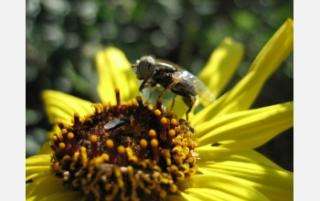Increased Competition for Pollen May Lead to Plant Extinctions

The decline of birds, bees and other pollinators in the world's most diverse ecosystems may be putting plants in those areas at risk, according to new research. The finding raises concern that more may have to be done to protect Earth's most biologically rich areas, scientists say in an article appearing in the Jan. 17 issue of the Proceedings of the National Academy of Sciences.
The analysis shows that ecosystems with the largest number of different species, including the jungles of South America and Southeast Asia and the rich shrubland of South Africa, have bigger deficits in pollination compared to the less-diverse ecosystems of North America, Europe and Australia.
"The global pattern we observed suggests that plants in species-rich regions exhibit a greater reduction in fruit production due to insufficient pollination than plant species in regions of lower biodiversity," said Susan Mazer, a co-author of the article and a biologist at the University of California, Santa Barbara. She and her colleagues believe such biodiversity "hotspots" are characterized by stronger competition among plant species for pollinators, such that many plant species simply don't receive enough pollen to achieve maximum fruit and seed production.
"Many plants rely on insects and other pollen vectors to reproduce," said Jana Vamosi, an evolutionary biologist at the University of Calgary and co-author of the paper. "We've found that in areas where there is a lot of competition between individuals and between species, many plants aren't getting enough pollen to successfully reproduce. If plants can't survive, neither can animals. These biodiversity hotspots are important because they are where we most often find new sources of drugs and other important substances. They are also the areas where habitat is being destroyed the fastest."
The study analyzes 482 field experiments on 241 flowering plant species conducted since 1981. The research took several years to complete; all continents except Antarctica are represented.
The analysis, which was sponsored by the National Center for Ecological Analysis and Synthesis (NCEAS) at the UC-Santa Barbara, and was funded by the National Science Foundation (NSF), "can tell us things about ecological processes that individual studies can't," Mazer said, noting that the synthesis could not have been done 25 years ago because few careful field studies of this type had been conducted. "Our detection of global patterns required the simultaneous analysis of many studies conducted independently by plant ecologists all over the world," she said.
Mazer cautioned that it is not yet possible to determine whether low pollination observed in species-rich areas is a new phenomenon or a long-standing one. It may be a recent problem due to habitat fragmentation or destruction, she said, or it may be long term. Plant species in ecologically complex areas may be continually faced with new competitors, and therefore cannot evolve as rapidly as their environment changes. If that is true, she said, pollen limitation may be a chronic problem for species in biodiversity hotspots--a challenge they have coped with for millions of years.
"The pattern raises the alarm, however, that these species face two challenges that increase the risk of extinction: habitat destruction, which is occurring at alarming rates in the tropics, and reduced pollinator activity," said Mazer.
In addition to Vamosi and Mazer, authors include Tiffany Knight at Washington University; Tia-Lynn Ashman and Janette Steets at the University of Pittsburgh; and Martin Burd at Monash University in Melbourne, Australia.
Source: NSF
















